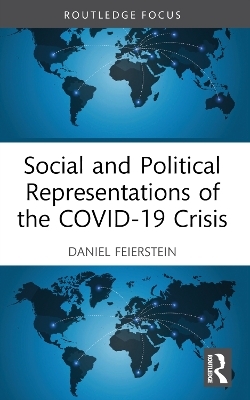
Social and Political Representations of the COVID-19 Crisis
Routledge (Verlag)
978-1-032-21279-1 (ISBN)
Weaving together political, sociological, psychological, and epidemiological analyses, Social and Political Representations of the COVID-19 Crisis provides revealing insights into the transformations wrought by the pandemic and the social divisions it has exposed. Accounting for the realities of the pandemic across the globe, with a strong focus on experiences in the Global South, this book challenges readers to question their beliefs about the societies they live in and how these societies should respond to collective catastrophes. Originally published in Spanish, this English edition is thoroughly revised and updated.
Social and Political Representations of the COVID-19 Crisis analyzes the varied strategies attempted in different parts of the world to deal with the pandemic, including elimination, mitigation, flattening the curve, and herd immunity, and the ramifications of these approaches. It argues that the different strategies are guided by social representations that can be analyzed on epistemological, emotional, and ethical-moral levels. Drawing upon a wide range of thinkers, the book also investigates the key role of psychological defense mechanisms, including different ways of denying the seriousness of the pandemic and different paranoid responses to pain and frustration, such as scapegoating and conspiracy theories.
This timely book analyzes the transformations in the social fabric brought about by the pandemic and the questions it poses for the future of our societies. It will therefore be of great interest to students and researchers in the humanities, social sciences, and public health, as well as the general reader.
Daniel Feierstein is Director of the Centre of Genocide Studies at the National University of Tres de Febrero, Argentina, and Director of the Observatory of State Crimes at the University of Buenos Aires, Argentina. He is also Senior Researcher at the National Research Council of Argentina (CONICET). His work primarily focuses on genocidal social practices and has been crucial in the increased recognition of the Argentine military junta’s crimes as genocide. He is a previous president of the International Association of Genocide Scholars and has acted as a judge on the Permanent People’s Tribunal in Sri Lanka, Mexico, Myanmar, and Colombia. He is the author of several books, including Genocide as a Social Practice: Reorganizing Society under the Nazis and Argentina’s Military Juntas (Rutgers University Press, 2014) and Memorias y Representaciones: Sobre la elaboracion del genocidio I (FCE, 2012). During the COVID- 19 pandemic, Feierstein participated in numerous national and provincial advisory councils in Argentina assessing the social aspects of the crisis.
Foreword by J. Michael Ryan, Acknowledgments, Introduction, 1. The dispute over the representations of COVID-19, 2. Denial and other demons: The role of psychological defense mechanisms in the COVID-19 crisis, 3. Projection, paranoia, and conspiracy theories during the COVID-19 crisis, 4. Taking stock of the crisis of COVID-19
| Erscheinungsdatum | 31.01.2024 |
|---|---|
| Reihe/Serie | The COVID-19 Pandemic Series |
| Übersetzer | Douglas Andrew Town |
| Verlagsort | London |
| Sprache | englisch |
| Maße | 138 x 216 mm |
| Gewicht | 453 g |
| Themenwelt | Studium ► Querschnittsbereiche ► Epidemiologie / Med. Biometrie |
| Sozialwissenschaften ► Soziologie | |
| ISBN-10 | 1-032-21279-9 / 1032212799 |
| ISBN-13 | 978-1-032-21279-1 / 9781032212791 |
| Zustand | Neuware |
| Haben Sie eine Frage zum Produkt? |
aus dem Bereich


